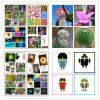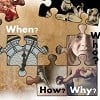When you read a book, do you stop yourself and look up for meanings of unknown w
When you read a book, do you stop yourself and look up for meanings of unknown words?
When you read a book, do you stop yourself and look up for meanings of unknown words in the dictionary or finish the book by relating the words in context or note down the new words, whose meanings you look up later. Which one do you think is better when you don't want to lose the joy of continued reading and also want to understand all the vocabulary?Some times, yes i do prefer to check a dictionary for unknown words. But many times I just prefer to check on the dictionary in the Mobile phone as well as online when I am online for that matter. Though it may not sound very advisable but being always in short of time does not allow me the luxury of checking the dictionary which i prefer as it gives a complete knowledge of the word.
Thank you...its a good question to answer.- Garifaliaposted 13 years ago
0
Never, and I always have unknown words. Depending on how good a writer is, the meaning usually unfolds from the context.
Not usually, I'm actually okay with words. However, if its something I don't know I will... I guess that is a yes? confusing.
Normally it's possible to work out from context, but when it isn't then I will look it up. It's always great to know more words! I usually check the meanings of English words online as a quick google search is a lot easier to do than to trawl through a dictionary, and it's much easier for me to tell if I'm getting an accurate definition in my mother tongue. With German words I'll normally look the word up in a good dictionary as I prefer to get the true meaning from an authoritative source.
Yes, it go's with being a poet, if there is a word i do not know I have to know what it means, maybe later on i will incorporate it into one of my poems.
yes when I read a text book or if I am reading a novel I will look it up at the end of the chapter if I have no clue what the meaning is!
I typically read books in front of my computer with an online dictionary page open just in case I need to look up words. I like to look up words quickly and them move on. I find that having an online dictionary open minimizes the disruption of having to look up words. Minimizing the disruption helps me maintain a flow in my reading.
Yes. I normally will write down those words and check out on dictionary for its meaning. It is always great to learn new words and its meanings.
If I am reading in English and find a word I don't know, I am intrigued. I would say it happens rarely. (One recent exception was reading "The Singularity is Near").
Even if I can guess the general meaning, I turn a tiny corner down on that page-- and then look up the word when I'm done with the book.
(and then of course smooth out that corner so the next reader has smooth pages:)
If I'm reading in a different language, I usually just look up unknown words if they are repeated.No. Neither. I always mean to start this habit, but I usually get caught up in what I'm reading and just guess at new words as I go. I just got a Kindle and that built-in dictionary is so cool. But to be honest, I don't use it when I'm reading either - only when I'm playing around with the dictionary feature (which involves skimming pages for unfamiliar words rather than actual reading.)
I suppose the best way, if I really wanted to get that habit of learning new words would be to do the skimming and looking up part first, then read for information or enjoyment after I've learned the unfamiliar words.Yes, it helps me understand what I am reading and it expands my vocabulary.
No the truth is that I have rarely stopped midway and tried to look up the meaning of a word. Invariably most people try to guess the meaning or the context in which the word has been used and then later when they get the time consult the dictionary. But in case you are online it is a different ball game as you can simultaneously look up the meaning in a new tab
Yep, both. When I am reading a study book, e.g. "21st Century Science and Health," I stop and look up words on the spot. I even create a vocabulary list. However, when I am reading a book for entertainment, I relate words in context.
When I read a book I stop myself and look up meanings for the unknown words. I either use a dictionary or wikipedia or some other online dictionary. The reason I don't keep reading is because I know that word will keep on bugging me where I keep trying to figure it out. I think it's better to stop and look up the word so that you know what the writer is trying to convey.
Sometimes I don't bother but it's better if you do. Not only do you understand what you are reading better, but as if by magic that word starts cropping up all over the place and you realize you must have been ignoring it for years.
I can usually discern meaning from context but when unable to do so, I stop and look up the word. Always. Reading should be a vocabulary building exercise.
I only stop to look up words when I'm reading my Kindle. I'll jot down unknown words I come across in print and keep them in a journal to review later.
Absolutely. Although it happens rarely but when it does I stop reading and look up the word. I need to know what I'm reading. My daughter is in the 4th grade and every now and then she brings home a different book - whatever her teacher assigned the class. I try to read with her as much as I can and she's an excellent reader but sometimes I become suspicious of certain words so I stop her and ask her if she knows what they mean. If she doesn't I make her look them up.
What I've done is that I write down unknown words and figure out the meaning by context, then after reading the book look up all the unknown words in the dictionary with examples, this way would be difficult to forget the meaning of the word.
Related Discussions
- 15
Do you prefer to use short or long words, when in fact the variance in meaning i
by MarieLB 8 years ago
Do you prefer to use short or long words, when in fact the variance in meaning is negligible?If you read Quora you will already know this. But for others, I would like to share what I found so interesting; only after you tell me what is your view on this.
- 12
What is yr definition of persecution?
by Jacqui 11 years ago
What is yr definition of persecution?What do you view as 'being persecuted?' Or being a victim of 'persecution'? A lot of people have different definitions of it - I'd like to know what you think it is - but here is The dictionary def - 1. To oppress or harass with ill-treatment, especially because...
- 27
Do teachers still teach students how to use a dictionary or is this becoming obs
by Denise Handlon 13 years ago
Do teachers still teach students how to use a dictionary or is this becoming obsolete?I use a dictionary (book) when I write, which I keep at my side. I've heard from a few people that NO ONE uses dictionaries anymore. (obviously they are wrong b/c there is at least still one,...
- 15
How do you stop yourself from cheating on your spouse/partner?
by JP Carlos 13 years ago
How do you stop yourself from cheating on your spouse/partner?It's really sad that many couples separate because of a cheating partner. There are faithful people and there are those that are not. What suggestions can you give so that one can avoid cheating on their spouse/partner.
- 4
How do you stop yourself from smacking your teenage daughter in the mouth?
by Julie2 15 years ago
How do you stop yourself from smacking your teenage daughter in the mouth?You can ask in a polite manner for help with the most simple of chores as dishes or laundry. Yet you will get a response that just makes you picture yourself flying across the room like a mad woman and "SMACKING"...
- 32
Do people nowadays prefer to read in the Internet rather than actual books?
by telltale 7 years ago
Do people nowadays prefer to read in the Internet rather than actual books?Do people read books at all nowadays? I noticed that not many people prefer to go to the library for books, what do you think?

























